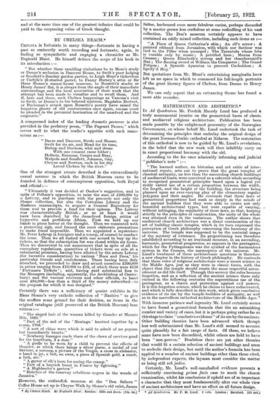BY CHELSEA REACH.*
CHELSEA is Tort:I:late. in many things—fortunate in having a past so eminently worth recording and fortunate, again, in finding so sympathetic and engaging a chronicler as Mr. Reginald Blunt. He himself defines the scope of his book in its introduction :— " But whether these rambling visitations be to More's study or Donne's seclusion in Danvers House, to Swift's poor lodging or Smollett's Sunday garden parties, to Leigh Hunt's tinkerdona or Carlyle's ill-starred garret, to Fanny Burney's attic or Sir Hans Sloane's manor-house museum, to Rossetti's studio or Henry James' flat, it is always from the angle of their immediate surroundings and the local association of their work that the attempt has been made to visualize and to recall them. And if, here and there, such Chelsea happenings as Vanessa' s visit to Swift, or Donne's to his beloved mistress, Magdalen Herbert, or Buchanan's attack upon Rossetti's poetry have raised the forgotten ghosts of old controversies once again, excuse must be pleaded in the perennial fascination of the unsolved and the enigmatic."
A compressed index of the leading dramatis personae is also provided in the prefatory poem, "The Pageant Passes," which serves well to whet the reader's appetite with such name- verses as :—
"Deere and Danvers, Steele and Sloane, Swift for its air, and Mead for its tone, Bishop and Duchess, whit and drone With one consent came hither ; Holbein, Erasmus, Gorges and Bray, Walpole and Smollett, Johnson, Gay, Cheyne and Newton, each in his day Loved Chelsea by the river."
One of the strangest events described is the extraordinarily casual manner in which the British Museum came to be founded in defiance of contemptuous opposition, both Royal and official :—
" Ultimately it was decided at Onslow's suggestion and in spite of Pelham's opposition, to raise the sum of 1300,000 by a Lottery, and to purchase with the proceeds not only the Sloane collection, but also the Cottoman Library and the Harleian manuscripts, to acquire a General Repository for these and to provide a fund for their upkeep. The Lottery was characteristically British ; or so at least it would have been described by the Jaundiced foreign critics of hypocritic and perfidious Albion. First we held up our hands in pious horror at the thought. Then we consented with a protesting sigh, and framed the most elaborate precautions to make fraud impossible. Then we appointed a mysterious Mr. Peter Leheup (a foreigner and a scamp, of course) to conduct the issue. Then we all rushed with one accord to buy up the tickets, so that the subscription list was closed within six hours. Then we discovered to our amazement that in spite of all the exemplary regulations, quantities of tickets were on sale at a substantial premium, having been allotted by the astute Leheup (for lucrative consideration) to various 'Roes and Does,' his particular friends and confederates. These having been duly absorbed, we proceeded to draw and award ourselves £200,000 in prizes ranging from £10,000 to £10, of which there were 4159 'Fortunate Tickets ' ; and, having paid substantial fees to the Managers (including, apparently, the Archbishop of Canter- bury) and the various receivers and other officials, to hand over f95,000—less than a third of the money subscribed—to the purpose for which it was designed."
Certainly there was a sufficiency of quaint exhibits in Sir Hans Sloane's very catholic collection of " Rarities " to give the scoffers some ground for their derision, as items in the original catalogue (still preserved at the British Museum) bear witness :--
"The singed hair of the woman killed by thunder at Mounts Mile, 1691."
"Part of the sail of the 'Montagu' knotted together by a storm, 1708."
"A sort of china ware which is said to admit of no poyson but immediately breaks."
"Newberry lozenges made there of the claws of crevices good for the heartburn 3 a dose."
"A girdle to be worn by a child to prevent the effects of thunder, at which there hangs a silver purse, a medal of our Saviour, a nutmeg, a picture of the Vergin, a cross in alabaster, a hand in jet, a bell, an ewer, a piece of Spanish gold, a comb, a fork, etc."
"A garter of genes horn for curing the cramp."
" Part of a hayrick burnt in France by lightning."
"A Highlander's garters." "Britches of the runaway rebellious negros in the woods of Jamaica."
however, the outlandiA museum at the "Don Saltero " Coffee House set up in Cheyne Walk by Sloane's old valet, James ! By C'helsea Reach. By Reginald Blunt. London : Mliii and Boon. hoe. 05.1 Salter, harboured even snore fabulous curios, perhaps discarded by a master grown less credulous at some reshuffling of his vast collection. The Don's museum certainly appears to have
contained an oddly mixed collection, including such items as
"A Piece of Queen Catherine's skin ; An elf's arrow ; A painted ribband from Jerusalem with which our Saviour was tied to the Pillar when scourge; The Tarantula whose bite is curable only by music ; A petrified ham ; Manna from Canaan • Queen Elizabeth's stirrup and her chambermaid's Hat ; The flaming sword of William the Conqueror ; The Grand Polipus ; A Spanish Aparatus to prevent Cuckoldom ; A lignify'd Hog."
But quotations from Mr. Blunt's entertaining marginalia have left us no space in which to commend his full-length portraits of the great literary figures of Chelsea, from Donne to Henry James.
We can only repeat that an entrancing theme has found a most able recorder.


































 Previous page
Previous page